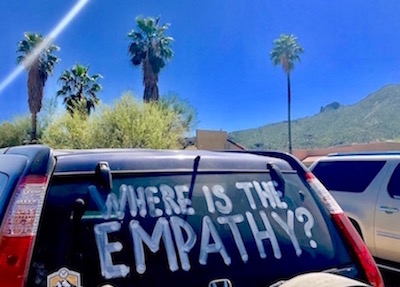“Often empaths don’t feel like they belong in this world and that’s because they have come here to create a better one.”
–Judith Orloff, MD, at a recent book signing in Tempe, AZ

A few years later, my dad, who worked in construction, came home from work one day and shared that a son fell off a ladder and died at his father’s feet on a job site. I sobbed. I had never met the son or the father so my response surprised my dad.
No one knew then, what I have since discovered: I am an empath. Loud noises, crowds, driving on freeways, and others’ joys and sadness impact me greatly. I thrive better in quiet, serene places, being in nature, surrounded by beauty and engaging in mutually reciprocal relationships.
That I feel deeply has often been misunderstood, even though I have toughened up over the years. Others sometimes have thought me rude because I cannot stay until the end of a party if I feel over stimulated.
My sensitivity has been both a blessing to those I love, care about and coach and a curse to me in moments when I have not set appropriate boundaries of self-care and protection.
One out of five people are highly sensitive, according to research conducted by Dr. Judith Orloff for her newly released book, The Empath’s Survival Guide…Life Strategies for Sensitive People.
Empaths, however, have an extra level of sensitivity, Orloff shares in the front cover of her book, where she explains the difference between having empathy and being an empath versus being highly sensitive:
“Empathy means our heart goes out to another person in joy or pain,” writes Orloff. “But empaths actually feel others’ emotions and physical symptoms in their own bodies, without the usual defenses most people have.”
Often, as empaths, we are told that we are “too emotional” or too thin-skinned. Through our caring and vulnerable natures, we also become magnets to narcissists, who are the worst relationship partners for us, Orloff maintains. Some warning signs a person–who may first appear as charming, intelligent and caring–may be a narcissist, according to Orloff, are that he or she:
- becomes cold and withholding if you disagree with him or her.
- acts as if life revolves around him or her.
- downplays others’ feelings or interests.
- craves admirations and attention; needs constantly to be complimented.
- always brings the conversation back to themselves.
- has a grandiose sense of self-importance and entitlement.
- lacks empathy.
Empaths tend to be more gullible, so we have to be careful not to be easily manipulated or be made “wrong” by others who cannot take responsibility for their actions.
Recently, in prelude to a healing service I was attending, the man introducing the spiritual teacher that was going to lead the chapel sermon that day, said this:
“Hurting people hurt others.”
Learning to set boundaries and step aside from attacks of others’ misdirected anger has been one of my toughest lessons as an empath. It is my nature to want to send love, compassion and nurturance when someone is hurting.
“The goal for all empaths is to lead more comfortable lives by learning how to stop soaking up negative energy,” Orloff writes in her book. “We may instinctively want to take away another’s pain, but that’s not healthy for us.”
BE AROUND PEOPLE WHO CAN CELEBRATE YOU
Orloff suggests empaths look for relationships where we can be celebrated and honored for our sensitivities, which allow us to love deeply as aware and vulnerable beings.
Other gifts of empaths can include our ability to perceive the big picture on a deep level and experience exquisite passion, joy, and beauty.
We are often considerate, tolerant, generous, devoted, kind and take good care of each other, Orloff noted at her book signing a few months ago in Tempe, AZ.
“You need to have loved ones who care and know about your feelings, and who can respect your need for alone time,” she said.
Empaths also are most comfortable with heart-centered energy and consistency, which fosters trust and acceptance, she noted later in the evening.
When empaths heals past wounds of abuse, neglect and addiction from relatives, we have the ability to change ourselves, our families (including generations of negativity) and the world, Orloff stated in her book.
In fact, she believes empaths can become the most effective agents of change, representing a new model of leadership, which this world so desperately needs. As she says in her book:
“The earth is not an enlightened plant. It is filled with tremendous suffering as well as tremendous joy. Our role as empaths is to use our sensitivities for the greater good and to tip the balance toward the light. Empaths must become warriors of light. Don’t let the dark scare you. Trust the power of compassion. We need you to raise the vibration of the world. Children and adults change for the better when they are around others with strong, loving and sensitive energy. You can embody that. The only obstacle that keeps you from shining is fear. As empaths, it is our job to gradually heal our fears so that they don’t block our way to the light. As you do so, remember that you are not alone. You have angels and protection around you.”
In honoring the calling to serve with light,
Gail
To serendipity: My friend, Tracy McCormick, owner of LightFinder Public Relations, (and another empath—no surprise the name of her company should reflect “light”) as she develops a creative pursuit in photography took the above photo a few days before I wrote this blog post. The message appeared on the car belonging to the owners in front of their restaurant, Local Johnny’s, Cave Creek, AZ.
Originally published at www.supportmatters.com


